Where in Siberia to talk about IT
Yes, there are many places: Omsk, Tomsk, Krasnoyarsk, Barnaul and, of course, the capital of Siberia - Novosibirsk, where the annual ITF conference CodeFest takes place every year.
Every year, 1,500–2,000 IT specialists flock to the CodeFest, thus providing the entire tourist revenue of Novosibirsk for several months in advance.
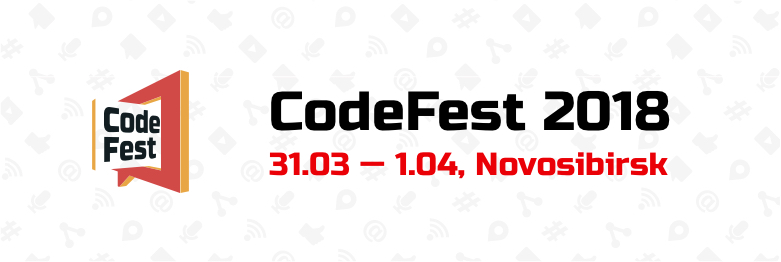
')
The first mention of CodeFest on Habré dates back to 2010. Since then, we have repeatedly made an attempt to settle on Habré, but matured just now. We will share useful presentations, announcements of the next CodeFest and our experience in organizing a major IT event.
This year's program is waiting for us both traditional and unconventional. From the traditional: sections about QA, Backend, Frontend, Mobile, Design and Management. Unconventional - Keynote- and Teamlead-streams.
In Keynote-stream, the smartest people of our time will talk about the future, inspiration and personal experience that changed everything.
In Teamlead-stream, timlids - and who else - will tell about their experience and share pains, which, as it turned out, are the same for many, and figure out what to do next.
The site has already published ≈ 80% of the speakers, and we lay out the program grid closer to February 26th. Now - more about the PM-section.

The flexible methodologies that stirred IT nine years ago seemed like a magic pill to many: “Now our development will be fast, managers will be effective, and the product will blow up the market!” But it turned out that over time, managers "burn out", Agile "out of the box" does not take off, the developers do not feel their value, and the teams stop hearing each other. Something needs to be changed. And preferably constantly.
That's about these changes and will be the PM-section.
Watching the processes in large companies is like disassembling a collection of cases: legacy and new experimental projects, small and large teams, interconnections and autonomy. There is something to take note.
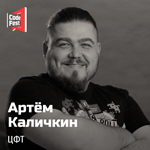 Artyom Kalichkin from CFT will talk about his experience with the Scramble methodology and its more effective alternatives.
Artyom Kalichkin from CFT will talk about his experience with the Scramble methodology and its more effective alternatives.
“Why take your eyes off Kanban if he decides?”
⠀
⠀
⠀
George Mogelashvili from Booking.com will share his observations on how to survive the team in a changing company and at the same time grow as a professional.
Sergey Markov from Instagram will tell you how the development works in Silicon Valley and what IT companies can get from there, regardless of profile and size.
Two news about project management. Good - the right processes are right for your company. Bad - due to changing priorities, growing teams and "surprises" of competitors, they periodically turn into a pumpkin.
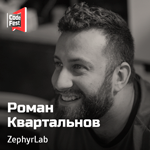 Roman Kvartalnov from ZephyrLab will share his experience in the fight against the decline in team productivity with increasing numbers.
Roman Kvartalnov from ZephyrLab will share his experience in the fight against the decline in team productivity with increasing numbers.
“Have you noticed that each new employee contributes to a decrease in team efficiency, and on a large scale can lead to the destruction of the entire team?”
⠀
⠀⠀
Samat Galiyev from Medusa will share his observations on how to balance the requirements for the development of large and “small but very important tasks” under tight budget constraints.
Evgeny Potapov from ITSumma will tell you how and why the management system changed in a company that grew from five to seventy-five people.
Dmitry Eremeev from Kinetica will tell how the customer, technical production and marketing can get along.
Maxim Bolotov from Inostudio - how in practice they come to things that theorists write about in project management books.
Agile teaches us how to survive in a changing world. In this case, Agile itself evolves so that the chips fly.
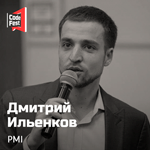 Dmitry Ilyenkov from the PMI Moscow office will talk about the struggle and unity of opposites - Agile and Waterfall.
Dmitry Ilyenkov from the PMI Moscow office will talk about the struggle and unity of opposites - Agile and Waterfall.
“There is no contradiction between Agile and Waterfall”
⠀
⠀
⠀
⠀
Maxim Tsepkov will share his experience on how to live in the hipster world of Agile, but be able to tell about it in the conformist language of classical management - “KPI”, “motivation”, these words.
For several years, the first letter in the section title means not only Project, but also Product. This year, in the grocery part of the section, we’ll talk about the mindset.
 Skyeng Khariton Matveyev will tell you how to teach developers to take responsibility for the business result, and business for the technological viability of the product.
Skyeng Khariton Matveyev will tell you how to teach developers to take responsibility for the business result, and business for the technological viability of the product.
“A business must earn money, and the developer must take responsibility for the business result”
⠀
Nikita Efimov from Selectel will tell you where to get and how to develop the team's “UX-culture”.
Alexander Byndyu from Byndyusoft - about the grocery thinking of customers at an outsource and how to live with the company developer.
⠀
About PM-section on this all. About the following - in the following posts or in self-study mode on the CodeFest site.
Every year, 1,500–2,000 IT specialists flock to the CodeFest, thus providing the entire tourist revenue of Novosibirsk for several months in advance.

')
The first mention of CodeFest on Habré dates back to 2010. Since then, we have repeatedly made an attempt to settle on Habré, but matured just now. We will share useful presentations, announcements of the next CodeFest and our experience in organizing a major IT event.
A little help for those who have never heard anything about CodeFest
- It is held in Novosibirsk every spring, which greatly adorns it.
- It is famous for its warm atmosphere, hot on the sidelines and cold attitude to advertising reports.
- Last year's tsishrikami:
- 1,800 participants;
- 90 speakers;
- 16 countries;
- + 4 ° C outside the window;
- 7 bars in the black;
- 2% GDP growth in Novosibirsk in March.
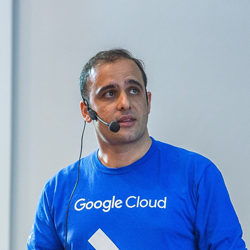 | 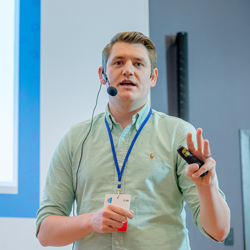 | 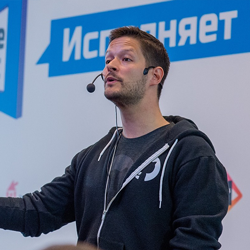 |
|---|---|---|
| Mete Atamel, Google | Alexander Gräbe, UBER | Marko Berković, GitHub |
| Congratulations to the organizers, the conference was cool and well organized. Participants were bombarded with questions after the show, I liked it. | The organizers were hardcore, and the mitaps are amazing. | Participants were super full of energy, interest and desire to learn. I have not seen this even at European conferences. Impressed! |
CodeFest 2018
This year's program is waiting for us both traditional and unconventional. From the traditional: sections about QA, Backend, Frontend, Mobile, Design and Management. Unconventional - Keynote- and Teamlead-streams.
In Keynote-stream, the smartest people of our time will talk about the future, inspiration and personal experience that changed everything.
In Teamlead-stream, timlids - and who else - will tell about their experience and share pains, which, as it turned out, are the same for many, and figure out what to do next.
The site has already published ≈ 80% of the speakers, and we lay out the program grid closer to February 26th. Now - more about the PM-section.

What is the section about
The flexible methodologies that stirred IT nine years ago seemed like a magic pill to many: “Now our development will be fast, managers will be effective, and the product will blow up the market!” But it turned out that over time, managers "burn out", Agile "out of the box" does not take off, the developers do not feel their value, and the teams stop hearing each other. Something needs to be changed. And preferably constantly.
That's about these changes and will be the PM-section.
Big companies
Watching the processes in large companies is like disassembling a collection of cases: legacy and new experimental projects, small and large teams, interconnections and autonomy. There is something to take note.
 Artyom Kalichkin from CFT will talk about his experience with the Scramble methodology and its more effective alternatives.
Artyom Kalichkin from CFT will talk about his experience with the Scramble methodology and its more effective alternatives.“Why take your eyes off Kanban if he decides?”
⠀
⠀
⠀
George Mogelashvili from Booking.com will share his observations on how to survive the team in a changing company and at the same time grow as a professional.
Sergey Markov from Instagram will tell you how the development works in Silicon Valley and what IT companies can get from there, regardless of profile and size.
Team 2.0
Two news about project management. Good - the right processes are right for your company. Bad - due to changing priorities, growing teams and "surprises" of competitors, they periodically turn into a pumpkin.
 Roman Kvartalnov from ZephyrLab will share his experience in the fight against the decline in team productivity with increasing numbers.
Roman Kvartalnov from ZephyrLab will share his experience in the fight against the decline in team productivity with increasing numbers.“Have you noticed that each new employee contributes to a decrease in team efficiency, and on a large scale can lead to the destruction of the entire team?”
⠀
⠀⠀
Samat Galiyev from Medusa will share his observations on how to balance the requirements for the development of large and “small but very important tasks” under tight budget constraints.
Evgeny Potapov from ITSumma will tell you how and why the management system changed in a company that grew from five to seventy-five people.
Dmitry Eremeev from Kinetica will tell how the customer, technical production and marketing can get along.
Maxim Bolotov from Inostudio - how in practice they come to things that theorists write about in project management books.
New in Agile
Agile teaches us how to survive in a changing world. In this case, Agile itself evolves so that the chips fly.
 Dmitry Ilyenkov from the PMI Moscow office will talk about the struggle and unity of opposites - Agile and Waterfall.
Dmitry Ilyenkov from the PMI Moscow office will talk about the struggle and unity of opposites - Agile and Waterfall.“There is no contradiction between Agile and Waterfall”
⠀
⠀
⠀
⠀
Maxim Tsepkov will share his experience on how to live in the hipster world of Agile, but be able to tell about it in the conformist language of classical management - “KPI”, “motivation”, these words.
Products
For several years, the first letter in the section title means not only Project, but also Product. This year, in the grocery part of the section, we’ll talk about the mindset.
 Skyeng Khariton Matveyev will tell you how to teach developers to take responsibility for the business result, and business for the technological viability of the product.
Skyeng Khariton Matveyev will tell you how to teach developers to take responsibility for the business result, and business for the technological viability of the product.“A business must earn money, and the developer must take responsibility for the business result”
⠀
Nikita Efimov from Selectel will tell you where to get and how to develop the team's “UX-culture”.
Alexander Byndyu from Byndyusoft - about the grocery thinking of customers at an outsource and how to live with the company developer.
⠀
About PM-section on this all. About the following - in the following posts or in self-study mode on the CodeFest site.
Source: https://habr.com/ru/post/348362/
All Articles